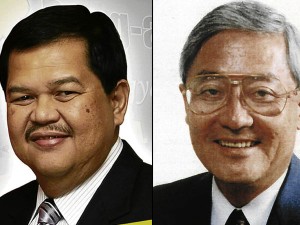MANILA, Philippines – Former Trade Minister Roberto V. Ongpin filed before the Ombudsman Thursday morning his complaint-affidavit against Bangko Sentral ng Pilipinas Deputy Governor Nestor Espenilla, alleging violation of the anti-graft law.
In a press statement, Ongpin’s counsel Alex Poblador accused Espenilla or violating Section 3 (e) of the Anti-Graft Law (Republic Act No. 3019), which punishes public officers for “causing undue injury to any party including the Government in the discharge of his official functions, or giving any private party unwarranted benefits, advantage or preference in the discharge of his functions, through manifest partiality, evident bad faith or gross inexcusable negligence.”
In the case filed by Ongpin against Espenilla at the anti-graft court, all four elements were claimed to be “clearly” present.
First, Espenilla, as deputy governor of the BSP and acting chairman of the Anti-Money Laundering Council (AMLC), is a public officer. Second, Ongpin noted that Espenilla had signed AMLC Resolution (which sought the ex parte application for a freeze order against Ongpin’s accounts, among others) as acting chair of the AMLC and Officer-in-Charge of the BSP. This he signed in the performance of his official duty or in relation to his public position.
Third, he said Espenilla’s act of signing the AMLC Resolution ran counter to the position which the BSP official had earlier taken and declared under oath before the Senate Blue Ribbon Committee. This turnaround, he said, was the “proximate cause of undue injury” to Ongpin and his companies.
As a result of the freeze order, he said the value of Ongpin’s shareholdings in publicly-listed Philweb Corp., Alphaland Corp., Atok-Big Wedge, ISM Communications and Philippine Bank of Communications dropped by about P3 billion on December 10th, the first trading day after the freeze order was publicized. The freeze order was extended for another six months on December 26th. As a result, he said the value of Ongpin’s shareholdings in the mentioned listed companies dropped by another P5 billion for a total of P8 billion in market values wiped out as a result of Espenilla’s action.
Other than the freeze order (which was initiated by the AMLC Resolution), the lawyer said there had been no other significant development that would have caused the value of the stock of these companies to “drop like a rock” across-the-board. That the blame lies squarely at the doorstep of Espenilla (for signing the AMLC Resolution) was “underscored by the fact that the PSE experienced almost record highs in terms of profits during the last quarter of 2012,” the lawyer said.
“Because of this enormous financial damage done to me by Espenilla, I will also file a major civil suit against Espenilla,” Ongpin said in this statement.
Ongpin alleged that Espenilla had acted with evident bad faith “or with gross inexcusable negligence, at the very least” when he signed the AMLC Resolution. He noted that on Oct. 14, 2011, during a joint hearing of the Senate Blue Ribbon Committee and the Committee on Banks & Financial Institutions, Espenilla had acknowledged under oath that from the point of view of the BSP as the regulator of banks, the sale by Development Bank of the Philippines of its 50 million Philex shares to a company beneficially owned and controlled by Ongpin was a “prudent” and “positive” transaction that resulted in “trading gains” for the bank.
“We have faith in the judicial system and we hope that the Ombudsman will be impartial in evaluating the complaint we filed against a ranking officer of the Bangko Sentral,” said Poblador.
The elements of the crime punished by the cited provision of the Anti-Graft Law are as follows:
* That the accused are public officers or private persons charged in conspiracy with them;
* That said public officers commit the prohibited acts during the performance of their official duties or in relation to their public positions;
* That they cause undue injury to any party, whether the Government or a private party; and
* That the public officers have acted with manifest partiality, evident bad faith or gross inexcusable negligence.
